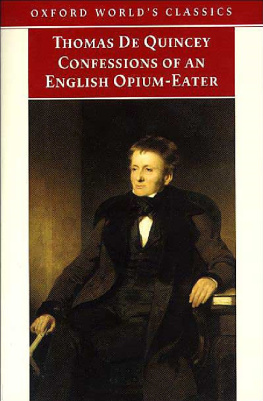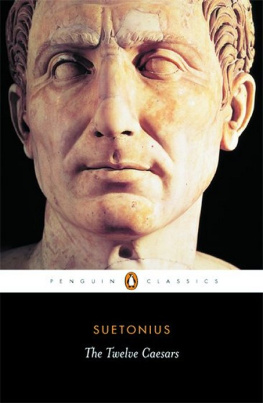THE CSARS.
The condition of the Roman Emperors has never yet been fully appreciated; nor has it been sufficiently perceived in what respects it was absolutely unique. There was but one Rome: no other city, as we are satisfied by the collation of many facts, either of ancient or modern times, has ever rivalled this astonishing metropolis in the grandeur of magnitude; and not manyif we except the cities of Greece, none at allin the grandeur of architectural display. Speaking even of London, we ought in all reason to saythe Nation of London, and not the City of London; but of Rome in her palmy days, nothing less could be said in the naked severity of logic. A million and a half of soulsthat population, apart from any other distinctions, is per se for London a justifying ground for such a classification; fortiori, then, will it belong to a city which counted from one horn to the other of its mighty suburbs not less than four millions of inhabitants [Footnote: Concerning this questiononce so fervidly debated, yet so unprofitably for the final adjudication, and in some respects, we may add, so erroneouslyon a future occasion.] at the very least, as we resolutely maintain after reviewing all that has been written on that much vexed theme, and very probably half as many more. Republican Rome had herprerogative tribe; the earth has its prerogative city; and that city was Rome.
As was the city, such was its princemysterious, solitary, unique. Each was to the other an adequate counterpart, each reciprocally that perfect mirror which reflected, as it were in alia materia, those incommunicable attributes of grandeur, that under the same shape and denomination never upon this earth were destined to be revived. Rome has not been repeated; neither has Csar. Ubi Csar, ibi Romawas a maxim of Roman jurisprudence. And the same maxim may be translated into a wider meaning; in which it becomes true also for our historical experience. Csar and Rome have flourished and expired together. The illimitable attributes of the Roman prince, boundless and comprehensive as the universal air,like that also bright and apprehensible to the most vagrant eye, yet in parts (and those not far removed) unfathomable as outer darkness, (for no chamber in a dungeon could shroud in more impenetrable concealment a deed of murder than the upper chambers of the air,)these attributes, so impressive to the imagination, and which all the subtlety of the Roman [Footnote: Or even of modern wit; witness the vain attempt of so many eminent sort, and illustrious Antecessors, to explain in self-consistency the differing functions of the Roman Csar, and in what sense he was legibus solutus. The origin of this difficulty we shall soon understand.] wit could as little fathom as the fleets of Csar could traverse the Polar basin, or unlock the gates of the Pacific, are best symbolized, and find their most appropriate exponent, in the illimitable city itselfthat Rome, whose centre, the Capitol, was immovable as Teneriffe or Atlas, but whose circumference was shadowy, uncertain, restless, and advancing as the frontiers of her all-conquering empire. It is false to say, that with Csar came the destruction of Roman greatness. Peace, hollow rhetoricians! Until Csar came, Rome was a minor; by him, she attained her majority, and fulfilled her destiny. Caius Julius, you say, deflowered the virgin purity of her civil liberties. Doubtless, then, Rome had risen immaculate from the arms of Sylla and of Marius. But, if it were Caius Julius who deflowered Rome, if under him she forfeited her dowery of civic purity, if to him she first unloosed her maiden zone, then be it affirmed boldlythat she reserved her greatest favors for the noblest of her wooers, and we may plead the justification of Falconbridge for his mother's trangression with the lion-hearted kingsuch a sin was self-ennobled. Did Julius deflower Rome? Then, by that consummation, he caused her to fulfill the functions of her nature; he compelled her to exchange the imperfect and inchoate condition of a mere fmina for the perfections of a mulier. And, metaphor apart, we maintain that Rome lost no liberties by the mighty Julius. That which in tendency, and by the spirit of her institutionsthat which, by her very corruptions and abuses co-operating with her laws, Rome promised and involved in the germeven that, and nothing less or different, did Rome unfold and accomplish under this Julian violence. The rape [if such it were] of Csar, her final Romulus, completed for Rome that which the rape under Romulus, her earliest Csar, had prosperously begun. And thus by one godlike man was a nation-city matured; and from the everlasting and nameless [Footnote: "Nameless city."The true name of Rome it was a point of religion to conceal; and, in fact, it was never revealed.] city was a man producedcapable of taming her indomitable nature, and of forcing her to immolate her wild virginity to the state best fitted for the destined "Mother of empires." Peace, then, rhetoricians, false threnodists of false liberty! hollow chanters over the ashes of a hollow republic! Without Csar, we affirm a thousand times that there would have been no perfect Rome; and, but for Rome, there could have been no such man as Csar.
Both then were immortal; each worthy of each. And the Cui viget nihil simile aut secundum of the poet, was as true of one as of the other. For, if by comparison with Rome other cities were but villages, with even more propriety it may be asserted, that after the Roman Csars all modern kings, kesars, or emperors, are mere phantoms of royalty. The Csar of Western Romehe only of all earthly potentates, past or to come, could be said to reign as a monarch, that is, as a solitary king. He was not the greatest of princes, simply because there was no other but himself. There were doubtless a few outlying rulers, of unknown names and titles upon the margins of his empire, there were tributary lieutenants and barbarous reguli, the obscure vassals of his sceptre, whose homage was offered on the lowest step of his throne, and scarcely known to him but as objects of disdain. But these feudatories could no more break the unity of his empire, which embraced the whole oichomeni;the total habitable world as then known to geography, or recognised by the muse of Historythan at this day the British empire on the sea can be brought into question or made conditional, because some chief of Owyhee or Tongataboo should proclaim a momentary independence of the British trident, or should even offer a transient outrage to her sovereign flag. Such a tempestas in matul might raise a brief uproar in his little native archipelago, but too feeble to reach the shores of Europe by an echoor to ascend by so much as an infantine susurrusto the ears of the British Neptune. Parthia, it is true, might pretend to the dignity of an empire. But her sovereigns, though sitting in the seat of the great king, (o basileus,) were no longer the rulers of a vast and polished nation. They were regarded as barbarianspotent only by their standing army, not upon the larger basis of civic strength; and, even under this limitation, they were supposed to owe more to the circumstances of their positiontheir climate, their remoteness, and their inaccessibility except through arid and sultry desertsthan to intrinsic resources, such as could be permanently relied on in a serious trial of strength between the two powers. The kings of Parthia, therefore, were far enough from being regarded in the light of antagonist forces to the majesty of Rome. And, these withdrawn from the comparison, who else was therewhat prince, what king, what potentate of any denomination, to break the universal calm, that through centuries continued to lave, as with the quiet undulations of summer lakes, the sacred footsteps of the Csarean throne? The Byzantine court, which, merely as the inheritor of some fragments from that august throne, was drunk with excess of pride, surrounded itself with elaborate expressions of a grandeur beyond what mortal eyes were supposed able to sustain.







